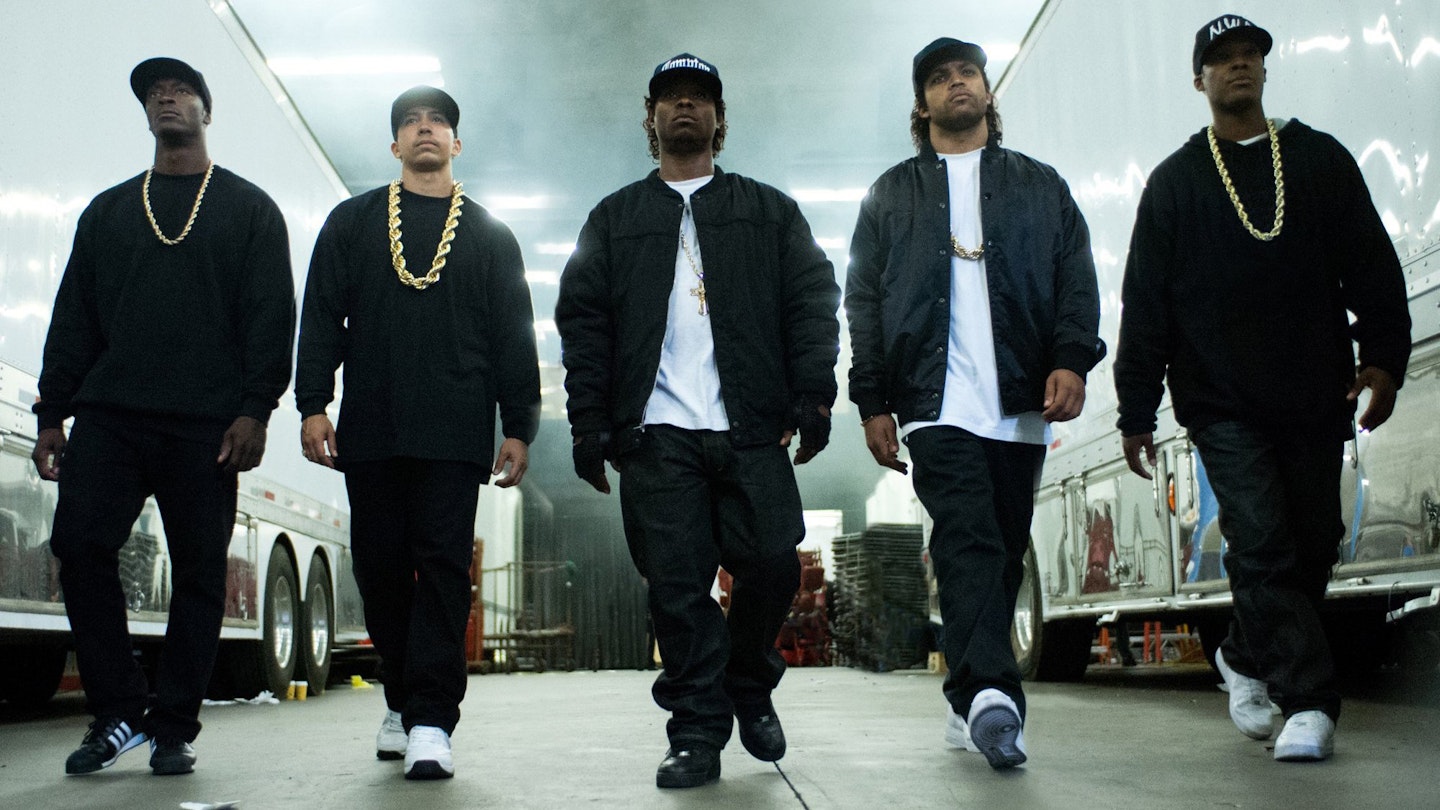Empire hits the set of Straight Outta Compton to witness Ice Cube relive the days he and N.W.A created gangsta rap and rocked the world...
*This article appears in issue 315 of Empire magazine, which is on shelves now and available to order here. *
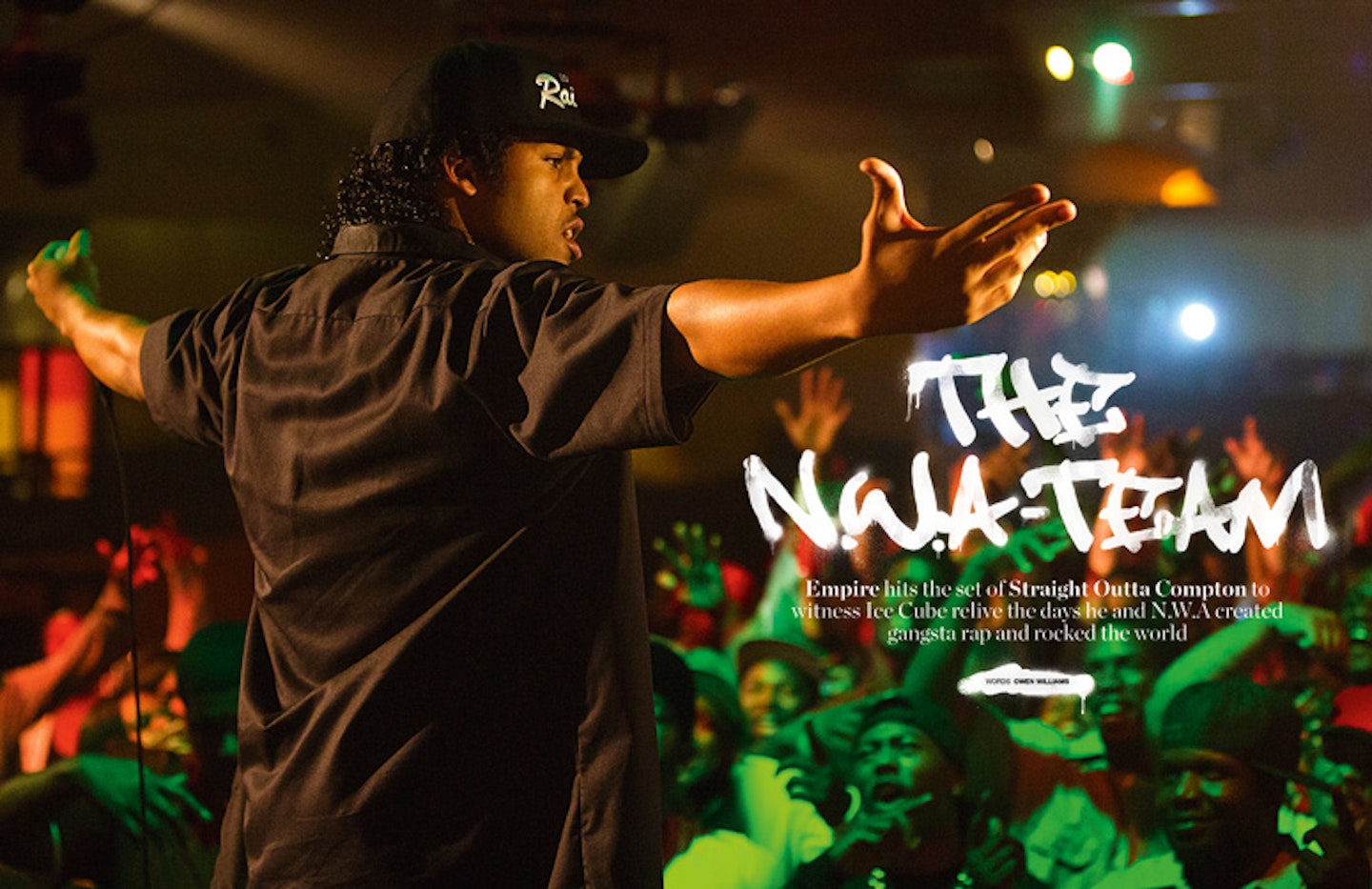
“Straight Outta Compton, crazy motherfucker named Ice Cube / from the gang called Niggaz With Attitudes...”
Raging from the opening track of the debut N.W.A album, we're left in no uncertainty as to what’s confronting us. This wasn’t a band, or a group, or a hip-hop ‘outfit’. Cube, Dr. Dre, Eazy-E, MC Ren and DJ Yella self-identified as a gang. A representative voice of disaffected youth coming straight outta South Central Los Angeles, with no less an agenda than to force the world to “witness the strength of street knowledge”.
In the 1980s, hip-hop was a New York thing: Run DMC, Public Enemy, LL Cool J. N.W.A ignited the ‘gangsta rap’ scene on the West Coast: a scene of posturing aggression and righteous fury. A few hundred thousand album sales later, America was quaking.
“Pretty quickly we started to have political forces coming after us telling us what we were doing was wrong,” Ice Cube tells Empire on the set of the movie he’s named after both that first album and first track. “We were doing music! As far as positive, that was some of the most super-positive creative shit we could’ve been doing, coming from where we come from. You want me to rap about breaking into your house, or actually break into your fucking house?”
Almost 30 years on from those incendiary days, Cube, along with co-producer Dr. Dre and director and frequent collaborator F. Gary Gray, is rekindling the memories on film, somehow cramming a decade of madness between five principal characters into a single two-hour narrative. Gray, a contemporary of N.W.A’s, started out shooting music videos (for Cube, Dre, Cypress Hill and others) and moved on to features, including Cube’s own Friday and the Mark Wahlberg-starring remake of The Italian Job.
Cube is these days a multi-platinum-selling solo artist with a sideline as a movie star (or perhaps it’s the other way around). Dre, through his work as a powerful and respected music producer and entrepreneur (his Beats Electronics line was acquired by Apple last year), has a Forbes-estimated personal worth of half a billion dollars. Those days on the street must seem a long time ago.
But Straight Outta Compton isn’t just a rags-to-riches biopic. Comparisons being thrown around on set are to Boogie Nights and Casino. “I realised it was history,” muses Gray. “I get a chance to not only direct a movie that captures a snapshot of American popular culture in that era and that time, but also direct a story that I was somewhat a part of. Very rarely do you get to be a journalist and a historian and also have that proximity to the characters and the history that they made. I thought it was important to focus on the why. LA in the ’80s, with the influence of drugs and military weapons and the gang culture... It was a very specific time in American history and a very specific time in Southern California. It was important to understand where we are and why a 16-year-old would write these lyrics.”
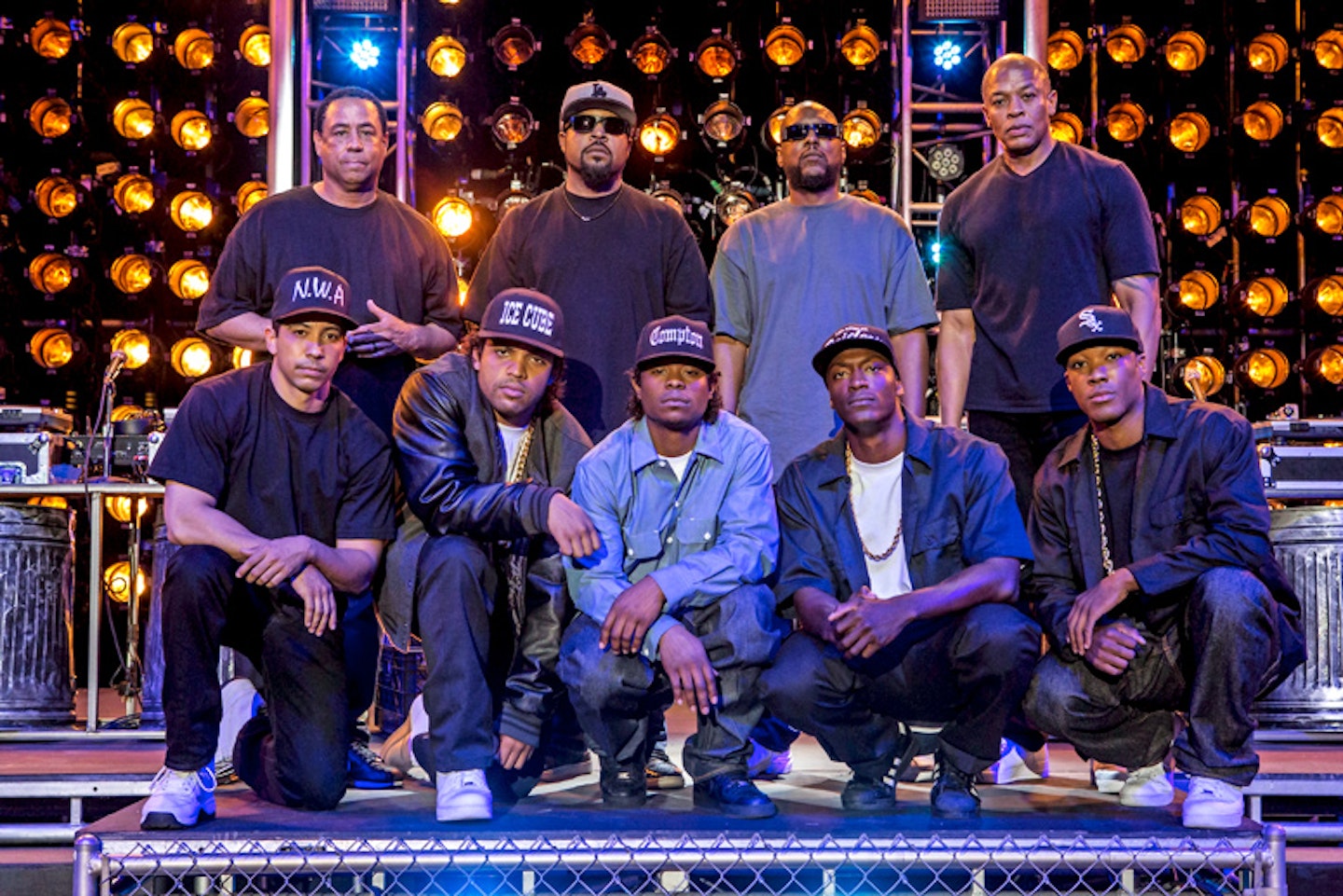
We’re promised elements of action and comedy and tragedy through a narrative that begins with mastermind Eazy-E bringing the gang together during the mid-’80s, ends with his untimely death in 1995, and takes in acrimonious departures and split-ups along the journey (Cube was out of N.W.A and owning his own career by 1990).
Today at Conway Studios in Hollywood, Empire is witnessing a lighter moment, without which the whole inferno may never have ignited. At this point, with no West Coast hip-hop precedent, the as-yet unnamed N.W.A are intending only to write and produce, and have brought rappers Home Boys Only (HBO) over from New York to record some tracks. HBO object to the lyrics, finding them too extreme and failing to identify with the specific LA culture they represent. They walk out, and Dre (Corey Hawkins) convinces drug dealer and street hustler Eazy (Jason Mitchell), who wrote the lyrics, to get on the mic and record them himself. The reluctant Eazy steps up and makes a pretty decent fist of a nascent version of Boyz-N-The Hood (“Cruisin down the street in my 6-4...”), and the seeds of N.W.A are sown.
It’s a long scene that develops as Empire watches. Early takes, sticking strictly to the screenplay, have a phoney kind of “let’s do the show right here” vibe to them, but as Gray allows his cast to improvise around the written words, it becomes looser and more natural.
“Gary has this thing where he wants us to ‘eat’,” Neil Brown Jr. (playing DJ Yella) explains afterwards. “He wants to get the scene down as it’s written, and then he comes in and says, ‘It’s time to eat,’ which means we can say what we want within the boundaries of the scene; keep it tight, don’t step over each other’s lines, but eat.”
“That’s an approach I’ve used forever,” confirms Gray. “You get a lot of warmth from actors when the chemistry’s right and you give them the space in the room to improvise beyond what’s been pre-packaged for them.”
Artificiality is obviously something all involved are keen to avoid. The contribution of multiple voices and original players, if not to the actual screenplay (by Andrea Berloff and Jonathan Herman) then at least to its development, certainly helps. A Cube-only N.W.A movie, even with the best intentions, would have been a highly subjective version of events, open to accusations of vanity-project-making — not least because Cube himself is played by his own son, O’Shea Jackson Jr.. With Dre, Yella, Ren and Gray all chipping in, the result is at least an amalgam of several viewpoints. Everyone remembers things slightly differently. Somewhere in the middle, a “truth” has been agreed upon.
“Some things are... foggy,” chuckles Cube. “It’s 25 years ago, so there’s a lot of chronic smoke done passed through. It’s like the record. We made the record by talking shit and arguing. Maybe the best argument wins. That’s how we made the movie. It’s cool, I expected it to be like that. I’d have been frightened if there hadn’t been some controversies putting this movie together. We’ve had our share of arguments, so I think it’ll be a good movie!”
The agenda, he stresses, was bigger than the band itself. “We had to mix in some signs of the times. What forged us together to make this kind of music? What were the forces against us? We’re talking about the LAPD, gangbanging, just having to overcome being from Compton. We had all these things
against us: crack cocaine, AIDS, Reaganomics... all this shit on top of the youth. It was a literal war on gangs. War on gangs? Gangs don’t wear a uniform, so if the police just think I look like a gangbanger, it’s a war on me! There was that kind of pressure on the youth of South Central Los Angeles, Compton and Watts. So that had to be in the movie too.”
Still, certain things had to give: while Brandon Lafourche was cast as Arabian Prince and appeared in some early photoshoots, the sixth founding member of N.W.A doesn’t appear in the film. “It felt like a mistake to focus on someone who wasn’t in the group for that long,” Gray shrugs. “It was a challenge to narrow ten years down into two hours. There’s so much that went on, but the bits that were informative and entertaining... those priorities stood out.”
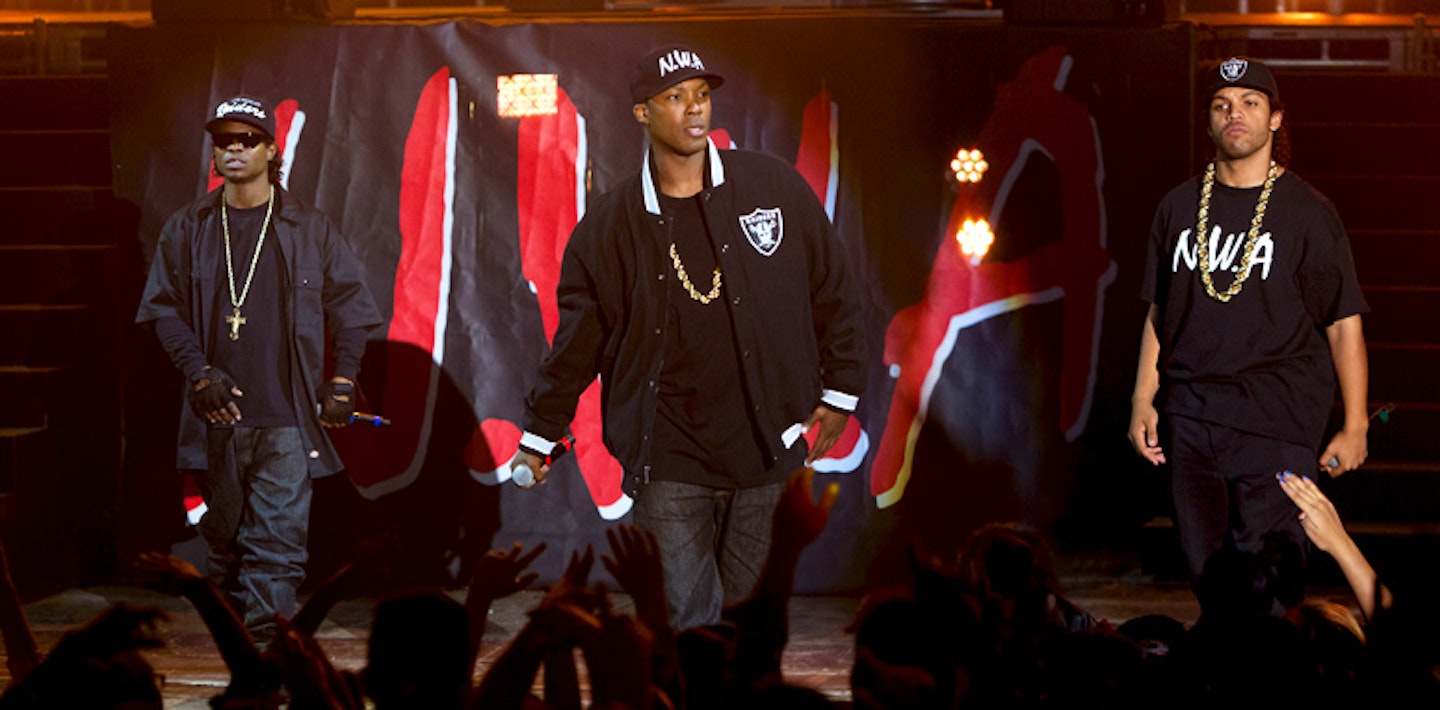
Cube and Dre have been developing Straight Outta Compton together for some years, with early talk of John Singleton manning the cameras (“They made a lot of movies about Elvis,” Cube jokes. “If they do another one about N.W.A, John can direct that one”). But with the screenplay and the director in place, there was still the enormous problem of casting. A headache that lasted months, the process meant auditioning countless hopefuls from across the US, until the perfect quintet was decided upon.
“The movie lives and dies with those choices,” says Gray, “and that was the most challenging part of the process. The music’s great. To have Cube and Dre involved was amazing. But if we didn’t get the cast right... It was a very narrow road. They have to be able to carry a movie that young, perform, and fit into this world of hip-hop with street credibility. Most of those things are usually exclusive. You’d have someone with street credibility who really didn’t have the chops to perform. You’d have someone who could perform but you didn’t quite believe they could even survive in Compton or South Central. You had a combination of things. We were really lucky in finding our guys.”
Those guys are the aforementioned Brown Jr., Jackson Jr., Hawkins and Mitchell, with Aldis Hodge playing Ren. Most of them are new to big roles, but all of them inhabit their real-life alter egos with uncanny accuracy. Paul Giamatti rounds out the principal cast as N.W.A’s eccentric manager, Jerry Heller. “He’s fuckin’ heaven sent,” Cube grins. “We have virtually all unknowns, so to have a heavy, very respected actor gives the movie some weight that we really needed. He gives the perfect sense
of what Jerry was...”
Jackson Jr., of course, would appear to have it the easiest since he’s playing his own father (which sounds like nepotism until you see how note-perfect he is), but “Pops” made sure he took months of acting classes to earn the privilege. “I’ve heard all these stories over and over for 23 years,” he grins, “so it’s great to get to re-enact them. Our parents never kept anything from us. I think they thought we’d find out sooner or later, so it might as well come from them! He was a young man... I’m a young man... I can put it together. Pops lets me know before every scene where his head was at.” He says the “wackest” part is the hair.
The super laid-back Mitchell, meanwhile (the rest of the cast shake hands; Mitchell hugs), has a harder job, since he was alone in being unable to meet his counterpart band member. “It was a curse and a gift,” he shrugs. “I have to embody what people only remember. Luckily Eazy had a lot of good friends and made an impact on a lot of people, and I could watch videos to get his mannerisms. The guys are telling me I’m getting it right.”
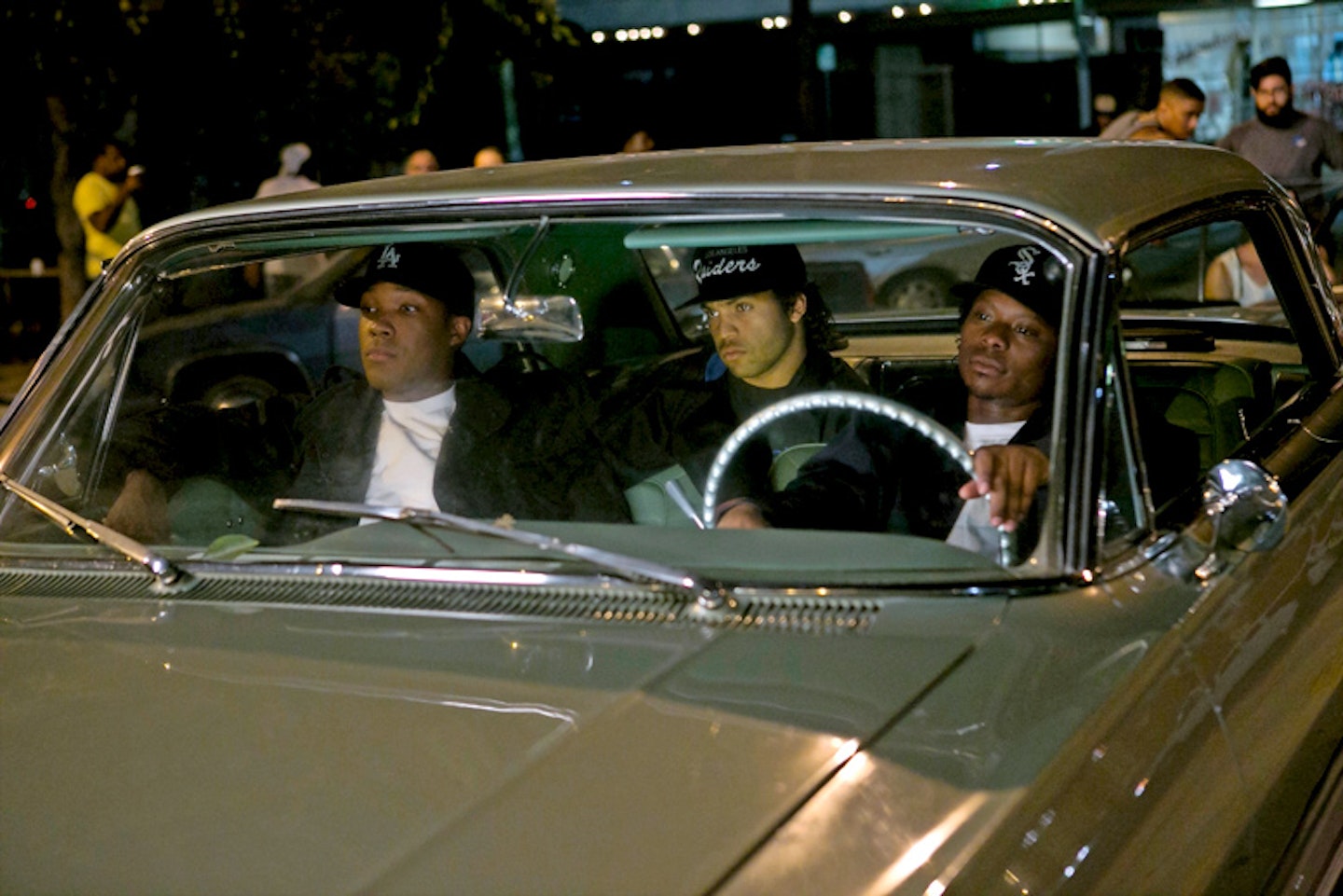
As a snapshot of an era as well as the story of young men enjoying ridiculous early success and notoriety, Straight Outta Compton can’t avoid driving by significant cultural moments, such as the LA riots of 1992, kicked off by Rodney King’s brutal beating by cops. Given recent events like the Oklahoma shooting of Eric Harris, various Fuck Tha Police parallels can be drawn between then and now, easily proving that N.W.A’s music and anger is still relevant, despite being penned by teenagers decades ago. But Gray says the film doesn’t labour this point, and while he has some violent action movies on his CV, his riots, he insists, aren’t that big a set-piece.
“It’s less about the scale and more about the emotion,” he says. “More about the impact and the feeling and the reaction to the [Rodney King] verdict. I wouldn’t say it was overly massive. Hopefully it makes the audience experience what it felt like... the disappointment.”
That’s not to say there aren’t explosions though. “We blew up a car by accident during a sequence in (South Central neighbourhood) Crenshaw,” Gray chuckles. “A lowrider was hopping, and it hopped so violently that the back end blew up. We caught it on film. There were a couple of moments like that.
I left it in the movie. You can’t plan for spontaneous moments like that, but as long as no-one got hurt, you throw it in! That’s what makes something like this feel real.”
Straight Outta Compton is out on August 28.
